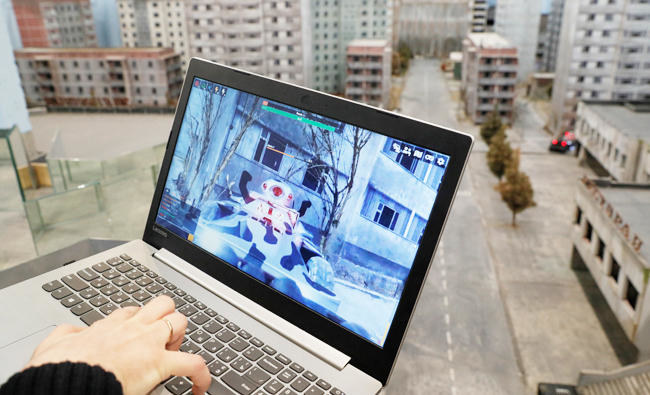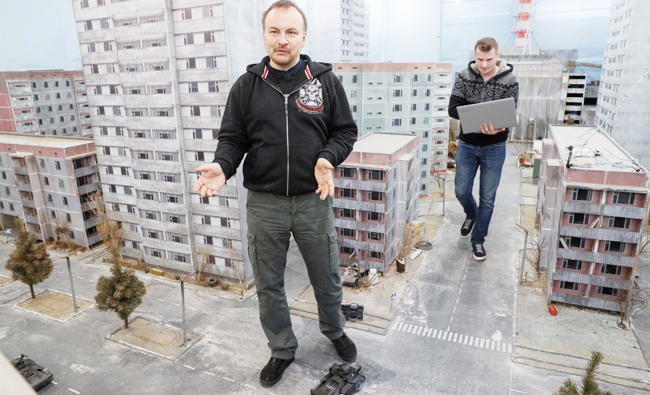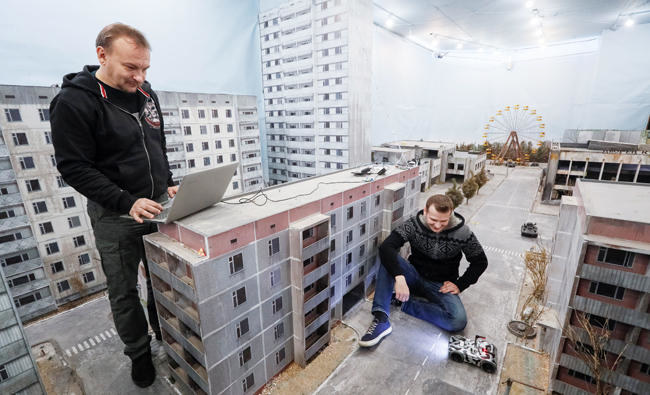KIEV: A Ukrainian computer game that brings to life a town abandoned after the Chernobyl nuclear disaster may not sound like everyone’s idea of fun but has attracted 60,000 people globally since its launch in October.
Players of “Isotopium: Chernobyl” drive tanks around the ghost town of Prypyat near Chernobyl, knocking out competitors as they search for an energy source called isotopium and collecting points every time they find some.
While the game takes its theme from the nuclear disaster at Chernobyl in northern Ukraine, which marked its 33rd anniversary on Friday, it was also inspired by the 2009 science fiction film “Avatar.”
Newcomers to the game think they have entered a virtual world when in fact they are controlling a real robot, equipped with a camera and computer, which makes its way around a model of the town rendered down to the tiniest detail.
“When playing our game, for the first 5-10 minutes many players don’t understand that it is not fictional,” said the game’s co-founder Sergey Beskrestnov. “They message us saying: ‘You have cool texture, you have good graphics, your designer is good, well done. You have a cool operating system.’
“People then reply: ‘It is not an operating system, it is real,’ and the player can’t believe it is real,” said Beskrestnov, speaking mid-game from Prypyat city square as he towers over surrounding five-story buildings.
Kiev-born Beskrestnov was just 12 years old when on April 26, 1986 a botched test at the nuclear plant in the then Soviet Union sent clouds of smoldering nuclear material across large swathes of Europe, forced over 50,000 people, including Beskrestnov’s family, to evacuate and poisoned unknown numbers of workers involved in its clean-up.
Beskrestnov and his partner Alexey Fateyev used Google maps and hundreds of pictures from the Chernobyl area to recreate Prypyat landmarks, including residential buildings, a hotel, concert hall, amusement park and a stadium.
The game’s real-scale model occupies a 180 square meter (1,938 sq. ft) basement of a residential building in the Ukraine city of Brovary, just 150 km (93 miles) from the Chernobyl Exclusion Zone and 30 km east of Kiev.
Miniature radioactivity warning signs, graffiti on the walls of abandoned buildings and tables and chairs left scattered inside a small cafe all add to the creepy atmosphere of a once lively town.
“It’s a really neat concept ...,” Shaun Prescott wrote in a review of the game published by PC Gamer magazine in January. “Controlling the tanks is kinda cumbersome, but they are tanks, after all.”
An attentive player will notice at least one inaccuracy – the real Chernobyl nuclear power plant is not located in town as it is in the game.
It costs $9 to immerse in the atmosphere of a post-apocalyptic town for an hour but only 20 people at a time can play simultaneously. Beskrestnov’s company, Remote Games, said 62,615 people around the world have registered to play the game, including around 15,000 in France and 10,000 in the United States.
A camera fixed on top of a moving tank broadcasts high quality signal in real time, allowing players from as far apart as Australia and Canada enjoy the game without facing any time delay in delivering video signals.
Its creators next ambition is to devise a game featuring the colonization of Mars in which 1,000 people will be able to simultaneously control robots on different missions involved in the operation.
“Many people advise us to contact Elon Musk directly because it resonates his dreams and ideas,” Beskrestnov jokes.
Chernobyl comes back to life in Ukrainian computer game
Chernobyl comes back to life in Ukrainian computer game

- An attentive player will notice at least one inaccuracy – the real Chernobyl nuclear power plant is not located in town as it is in the game
As an uncertain 2026 begins, virtual journeys back to 2016 become a trend

- Over the past few weeks, millions have been sharing throwback photos to that time on social media, kicking off one of the first viral trends of the year
LONDON: The year is 2016. Somehow it feels carefree, driven by Internet culture. Everyone is wearing over-the-top makeup.
At least, that’s how Maren Nævdal, 27, remembers it — and has seen it on her social feeds in recent days.
For Njeri Allen, also 27, the year was defined by the artists topping the charts that year, from Beyonce to Drake to Rihanna’s last music releases. She also remembers the Snapchat stories and an unforgettable summer with her loved ones. “Everything felt new, different, interesting and fun,” Allen says.
Many people, particularly those in their 20s and 30s, are thinking about 2016 these days. Over the past few weeks, millions have been sharing throwback photos to that time on social media, kicking off one of the first viral trends of the year — the year 2026, that is.
With it have come the memes about how various factors — the sepia hues over Instagram photos, the dog filters on Snapchat and the music — made even 2016’s worst day feel like the best of times.
Part of the look-back trend’s popularity has come from the realization that 2016 was already a decade ago – a time when Nævdal says she felt like people were doing “fun, unserious things” before having to grow up.
But experts point to 2016 as a year when the world was on the edge of the social, political and technological developments that make up our lives today. Those same advances — such as developments under US President Donald Trump and the rise of AI — have increased a yearning for even the recent past, and made it easier to get there.
2016 marked a year of transition
Nostalgia is often driven by a generation coming of age — and its members realizing they miss what childhood and adolescence felt like. That’s certainly true here. But some of those indulging in the online journeys through time say something more is at play as well.
It has to do with the state of the world — then and now.
By the end of 2016, people would be looking ahead to moments like Trump’s first presidential term and repercussions of the United Kingdom leaving the EU after the Brexit referendum. A few years after that, the COVID-19 pandemic would send most of the world into lockdown and upend life for nearly two years.
Janelle Wilson, a professor of sociology at the University of Minnesota-Duluth, says the world was “on the cusp of things, but not fully thrown into the dark days that were to come.”
“The nostalgia being expressed now, for 2016, is due in large part to what has transpired since then,” she says, also referencing the rise of populism and increased polarization. “For there to be nostalgia for 2016 in the present,” she added, “I still think those kinds of transitions are significant.”
For Nævdal, 2016 “was before a lot of the things we’re dealing with now.” She loved seeing “how embarrassing everyone was, not just me,” in the photos people have shared.
“It felt more authentic in some ways,” she says. Today, Nævdal says, “the world is going downhill.”
Nina van Volkinburg, a professor of strategic fashion marketing at University of the Arts, London, says 2016 marked the beginning of “a new world order” and of “fractured trust in institutions and the establishment.” She says it also represented a time of possibility — and, on social media, “the maximalism of it all.”
This was represented in the bohemian fashion popularized in Coachella that year, the “cut crease” makeup Nævdal loved and the dance music Allen remembers.
“People were new to platforms and online trends, so were having fun with their identity,” van Volkinburg says. “There was authenticity around that.”
And 2016 was also the year of the “boss babe” and the popularity of millennial pink, van Volkinburg says, indications of young people coming into adulthood in a year that felt hopeful.
Allen remembers that as the summer she and her friends came of age as high school graduates. She says they all knew then that they would remember 2016 forever.
Ten years on, having moved again to Taiwan, she said “unprecedented things are happening” in the world. “Both of my homes are not safe,” she said of the US and Taiwan, “it’s easier to go back to a time that’s more comfortable and that you felt safe in.”
Feelings of nostalgia are speeding up
In the last few days, Nævdal decided to hide the social media apps on her phone. AI was a big part of that decision. “It freaks me out that you can’t tell what’s real anymore,” she said.
“When I’ve come off of social media, I feel that at least now I know the things I’m seeing are real,” she added, “which is quite terrifying.”
The revival of vinyl record collections, letter writing and a fresh focus on the aesthetics of yesterday point to nostalgia continuing to dominate trends and culture. Wilson says the feeling has increased as technology makes nostalgia more accessible.
“We can so readily access the past or, at least, versions of it,” she said. “We’re to the point where we can say, ‘Remember last week when we were doing XYZ? That was such a good time!’”
Both Nævdal and Allen described themselves as nostalgic people. Nævdal said she enjoys looking back to old photos – especially when they show up as “On This Day” updates on her phone, She sends them to friends and family when their photos come up.
Allen wished that she documented more of her 2016 and younger years overall, to reflect on how much she has evolved and experienced since.
“I didn’t know what life could be,” she said of that time. “I would love to be able to capture my thought process and my feelings, just to know how much I have grown.”

















